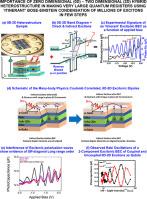Presence of coherent ‘resonant’ tunneling in quantum dot (zero-dimensional) - quantum well (two-dimensional) heterostructure is necessary to explain the collective oscillations of average electrical polarization of excitonic dipoles over a macroscopically large area. This was measured using photo excited capacitance as a function of applied voltage bias. Resonant tunneling in this heterostructure definitely requires momentum space narrowing of charge carriers inside the quantum well and that of associated indirect excitons, which indicates bias dependent ‘itinerant’ Bose-Einstein condensation of excitons. Observation of periodic variations in negative quantum capacitance points to in-plane coulomb correlations mediated by long range spatial ordering of indirect, dipolar excitons. Enhanced contrast of quantum interference beats of excitonic polarization waves even under white light and observed Rabi oscillations over a macroscopically large area also support the presence of density driven excitonic condensation having long range order. Periodic presence (absence) of splitting of excitonic peaks in photocapacitance spectra even demonstrate collective coupling (decoupling) between energy levels of the quantum well and quantum dots with applied biases, which can potentially be used for quantum gate operations. All these observations point to experimental control of macroscopically large, quantum state of a two-component Bose-Einstein condensate of excitons in this quantum dot - quantum well heterostructure. Therefore, in principle, millions of two-level excitonic qubits can be intertwined to fabricate large quantum registers using such hybrid heterostructure by controlling the local electric fields and also by varying photoexcitation intensities of overlapping light spots.


